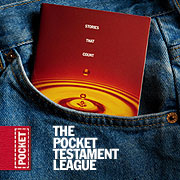This is from A Slice of Infinity:
Puddles, Rivers, and Waterfalls
Jill Carattini
In his book River Out of Eden, Oxford scientist Richard Dawkins
explains, "The universe we observe has precisely the properties we should
expect if there is, at bottom, no design, no purpose, no evil and no good,
nothing but blind, pitiless indifference."(1) In a similar vein, Dawkins
praises the humorous rejoinder of Douglas Adams to arguments that claim an
apparent order and purpose in the universe. Writes Dawkins, "To illustrate
the vain conceit that the universe must be somehow preordained for us
because we are so well suited to live in it, [Adams] mimed a wonderfully
funny imitation of a puddle of water, fitting itself snugly into a
depression in the ground, the depression uncannily being exactly the same
shape as the puddle."(2) Their claim is clear: Humanity has adapted to a
blind and indifferent universe like water to the shape of its container.
It is perhaps a claim that at times lingers suggestively in the desolate
places of life and mind.
Ernest Gordon, too, may have at one time agreed. An officer of the
British army during the Second World War, he was captured by the Japanese
while at sea. At the age of 24, he was sent to work in the prison camp
that would be constructing the Burma-Siam railroad.
For every mile of track, 393 men are said to have died. Wearing nothing
but loincloths, they worked for hours in scorching temperatures, chopping
their way through tangled jungles. Those who paused out of exhaustion
were beaten to death by guards. Treated like animals, the prisoners
became themselves like beasts trying to survive. Adapting to their harsh
captivity, theft was as rampant as disease among them. Gordon himself
eventually became so weak from illness that he was removed from the common
camp and placed in the Death House. He describes his purposeless existence
in that cruel and indifferent setting: "I was a prisoner of war, lying
among the dead, waiting for the bodies to be carried away so that I might
have more room."(3)
Each night the Japanese guards would count the work tools before anyone
was permitted to return to camp. One evening, when a shovel was found to
be missing, a guard shouted relentlessly that the guilty man must present
himself. When no one responded, he ordered callously, "All die! All
die!" At this, a young man stepped forward, confessing to the theft, and
was immediately killed before them.
The railroad prison camp by the River Kwai was a place where many could
have observed in horror that “the universe has precisely the properties we
should expect if there is, at bottom, no design, no purpose, no God
watching over those in dire need of hope." Like water conforming to the
shape of its container, the captured men became like men fighting to
survive, void of right and wrong, void of reverence for life, void of all
meaning. Yet, amidst the stagnant waters of hatred and bitterness,
something was astir.
After the incident with the shovel, upon returning to the camp, one of the
guards discovered a mistake in their counting. There had never been a
missing shovel. The young man that stepped forward was innocent; he had
sacrificed his life to preserve the lives of his fellow inmates. After
this incident, attitudes among the camp began to change dramatically.
Instead of men in a detached game of survival of the fittest, they began
to look out for each other. One of the men remembered the words of
Scripture: "Greater love has no one than this, that he lay down his life
for his friends." Gordon, who once lay forgotten for dead, was slowly
nursed back to health by fellow prisoners. Fully recovered, he eventually
became a makeshift chaplain of the camp. When the prison was liberated in
1945--three years after his capture--Gordon entered seminary to become a
minister of the message of Jesus Christ. "Faith thrives where there is no
hope but God," he later testified. How contrary to the words of Richard
Dawkins.
The transformation in the men of the prison was so thoroughly unlike the
world they were forced to live in that one could argue it was more like a
waterfall defying gravity and moving upstream than a puddle naturally
fitting into the crevice that holds it. The sacrifice of one innocent man
can reverse the flow of history. Perhaps the kingdom of God is indeed
among us, a spring of living water in a dry and weary land.
I don't know how the atheist can live and thrive in this world. Before Christ when I thought there was even a remote chance that God was not real, I was left in such a state of hopelessness, all I wanted to do was die. "If there is no God", I thought, "what is the point of living?" This was the state of mind I was in right before my blessed Savior rescued me from the pit of despair. I wanted to die every single day. If there is no heaven, if there is no God, what reason is there to live? Thank God He gave me my sight back! This weekend our church is having a giant outreach day. The pastor spoke about how to be involved. He exhorted folks who are afraid to serve because they don't know enough about God and are afraid to answer the hard questions of the skeptics. He said, "can you tell them how before Christ you were blind, but now you see? Can you tell them once you were lost, but now you are found?" People can try to refute the Bible all they want, they can't refute your personal experience.
So my friends, let me just tell you I once was lost, but now I'm found. I once was blind, but now I see. Thanks be to God for His indescribable gift!!!





No comments:
Post a Comment